Now that I’m most of the way through a tour of eastern Europe where local beers usually cost around US$1.50 for a half liter in most bars and restaurants, I thought I’d discuss something that took me quite a while to learn and that I feel passionately about. Simply put, don’t waste money on imported beers while traveling because you can’t tell them apart, and the local one adds more to your stories and memories.
You see it in almost every corner of the world where local lagers are cheap and plentiful, yet most bars also carry a few imported brands at much higher prices for people who think they prefer them. Normally I’m one who agrees that there are no rules in travel, but still I think it’s worth mentioning this situation that is both foolish and mildly insulting.
1 – The local one is the freshest, especially if it's draught
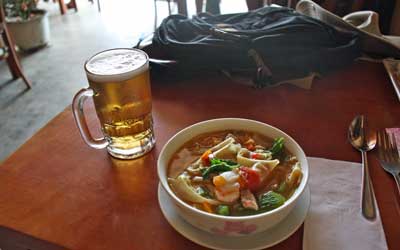
The difference can be even more pronounced when one or two beers dominate the local market. Speaking of Heineken, if you’ve been to Amsterdam you probably know that half the bars there carry ONLY Heineken, and sometimes Amstel (owned by Heineken). In these cases the bars don’t even bother with kegs because they have a tank that Heineken fills every day or two, meaning that the beer is brewery-fresh every day. So, order Heineken in Amsterdam, but not in Amman.
2 – The enjoyment of beer is 5% flavor and 95% the experience itself
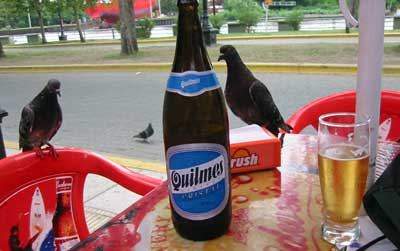
Here’s a short story about wine that probably applies to beer even more. A friend of mine is part of a famous wine family in the United States and she told me this story about a well known Italian wine maker. When asked what the best bottle of wine he ever had was he replied, “I remember the wonderful view that night, and I remember the girl I was with, and I remember the meal I had, but I don’t remember the name on the wine bottle.”
The point obviously is that enjoying wine is about the overall experience rather than the specific flavor, and it’s certainly the same with beer. If you are at a fantastic party on the roof of your hostel with loads of new friends from all over, the label on the beer is insignificant.
3 – You can't tell them apart by taste anyway
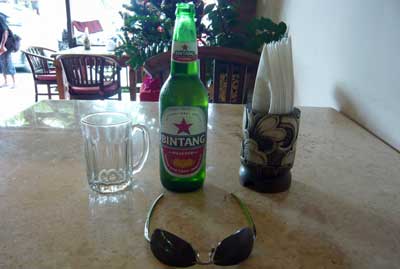
Not only have many studies shown that virtually no one can even identify the beer they claim is their favorite in blind taste tests, I’ve actually done this experiment myself with several groups of friends at different times.
Try it yourself and you might be amazed at how clueless we all really are. Buy 6 different beers, including ones you think you love and ones you think you might hate, and pour them into cups with a sticker at the bottom. Then you and your friends can rate each one blindly from best to worst. Not only will the results be a long way from what your non-blind preference is, you’ll find that actually identifying your own “favorite” beer is difficult or impossible.
4 – Status beers don't send the same message while traveling
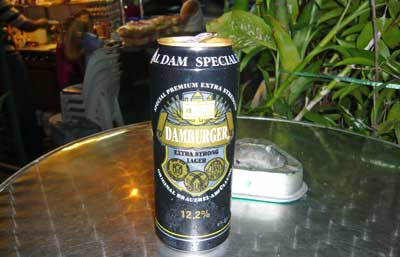
Chinese travelers are famous for eating only in Chinese restaurants no matter where they are, and that sort of inflexibility isn’t terribly endearing. I think it’s best if you start with the cheap local beer, and if for some reason you don’t care for it, jump up to a more expensive local beer. By your second glass you won’t be able to tell the difference, except in your own mind, anyway.
5 – The obscure foreign beer won't taste the same when you get back home

For one thing, it’s partly the freshness issue mentioned above, which also explains why Guinness tastes best in Ireland and Heineken tastes best in Holland. But even more it’s that we associate an incredible trip with the local beer and the taste was never a huge factor anyway.
For this reason, the same applies when you get home. Unless you are out to impress your friends by the label on your beer, you might as well try the cheap local one at home and see if it’s really as awful as you assumed when you initially rejected it.
Some places do make inferior beers, unfortunately
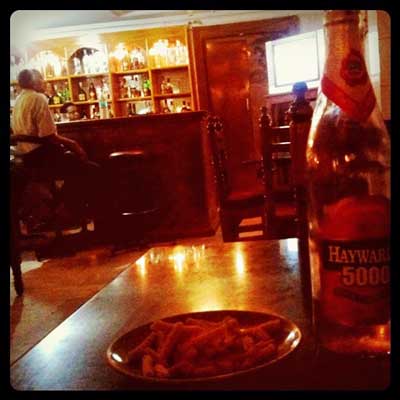
However, you don’t know about terrible beer until you’ve traveled around India. Kingfisher dominates the market in much of the country, and even as someone who likes cheap beers I have a hard time drinking it. The other brands seem just as bad, if not worse. My guess is that it might be inferior ingredients combined with the impossible task of keeping it cold at all times. A beer that is close to boiling during a 3-day train ride from the brewery is never going to taste good even after it’s been chilled down the line.
So I do admit that not every cheap beer is just as good as every other beer, but I do think that travelers are best off by starting with the local stuff and saving an import as a last resort.

Thanks for sharing info with us…
You must try Goa Kings Beer….It is just launched in mumbai…